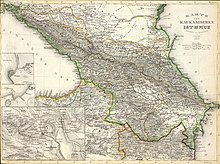Dadeschkeliani
The Dadeschkeliani or Dadishkeliani ( Georgian დადეშქელიანი, დადიშქელიანი ) are a princely house from Georgia, which came from the ethnic group of the Swans , which belonged to the Georgian nation and ruled parts of Upper Svaneti from the 1720s to 1857.
Although the house of dadeshkeliani asserted itself, from the 17th centuries over Northeast Caucasus ruling Schamchalen from the people of Kumyks descent, it is historically widely recognized that it by a princess from the also Svanetian Prince House of Gelovani descended and her son, Prince Dadesch, . The House of Gelowani, which has been documented in Svaneti since the 11th century and ruled as governors and dukes ( Eristawi ) since the 12th century, was almost completely destroyed in the middle of the 15th century in the war with the Mingrelian princely house of Dadiani and the Dadiani became princes of for three centuries Lower Svaneti (also called Dadiani Svaneti). Prince Dadesch was therefore born in exile in the Kabardine Principality of Kabarda (central North Caucasus) in the 15th century . His descendant Otar the Great succeeded in establishing himself in western Upper Svaneti (since then also called Dadeschkeliani-Svaneti) and gaining rulership since the 1720s, while the particularly inaccessible eastern Upper Svaneti remained without a ruler as the "Free Svaneti". The Dadeschkeliani came into conflict with the Dadiani in Lower Svaneti and Upper Svaneti a. a. with a surviving branch of the Gelowani family. In the middle of the 18th century, the Gelowani moved to Lower Swanetia, ended the rule of the Dadiani and became princes of Lower Swanetia. The ongoing conflict between the Dadeschkeliani and the Gelowani was only resolved in 1833 at the instigation of Russia and through the mediation of Mingrelian princes, and both royal houses formally accepted the Russian protectorate .
At the same time, in the 1830s, a feud broke out in the Dadeschkeliani house between the relatives Tsioch and Tatarchan Dadeschkeliani and then also between Tsioch's sons Tengis (baptized name: Nicholas), Islam, Tsioch (Michail) and Konstantin. Constantine, who temporarily fled into exile in Russia in 1842, first succeeded in defeating Tatarchan's sons and then in reducing the influence of his brothers. After the end of the Crimean War (1853–56), the Russian commander-in-chief of the Caucasus, Prince Baryatinsky, militarily annexed all the state structures that still existed in the Caucasus. In 1857 Lower Swanetia, Upper Swanetia of the Dadeschkeliani and finally the free Upper Swanetia were conquered. The last ruler of western Upper Svaneti, Prince Konstantin Dadeschkeliani, was exiled to Yerevan . In revenge, he killed the local military governor Prince Alexander Gagarin during an audience in Kutaisi in 1857 and was sentenced to death by a military tribunal and executed that same year.
After the Russian conquest, the Dadeschkeliani, like many other Caucasian princely houses, were integrated into the Russian nobility. They received a common coat of arms with the related Gelowani and were included in the rankings of the Russian official nobility. Some retained the status of autonomous princes in Svaneti. Most of the Dadeschkeliani still live in Georgia today , especially in their homeland Svaneti and, like all Georgian princes, are still highly regarded in society. Several Dadeschkeliani have been mentioned in the literature as hosts of alpinists who climbed the Ushba .
Individual evidence
- ↑ See Toumanoff, p. 270.
- ^ Arnaud Chaffanjon, "Le Petit Gotha Illustré" (1968).
- ↑ P. Dumin et al. "The Russian Imperial Nobility Encyclopaedia", Vol. IV (2002)
- ↑ See Sarkisyanz, p. 83.
- ↑ On these conflicts and the Russian conquest in 1857 cf. Sarkisyanz, p. 83.
- ↑ See Lang, pp. 96-97.
literature
- Emanuel Sarkisyanz : History of the oriental peoples of Russia until 1917. Munich 1961
- David Marshall Lang: A Modern History of Georgia. London 1963
- Cyrill Toumanoff : Studies in Christian Caucasian History. Washington / DC 1963



